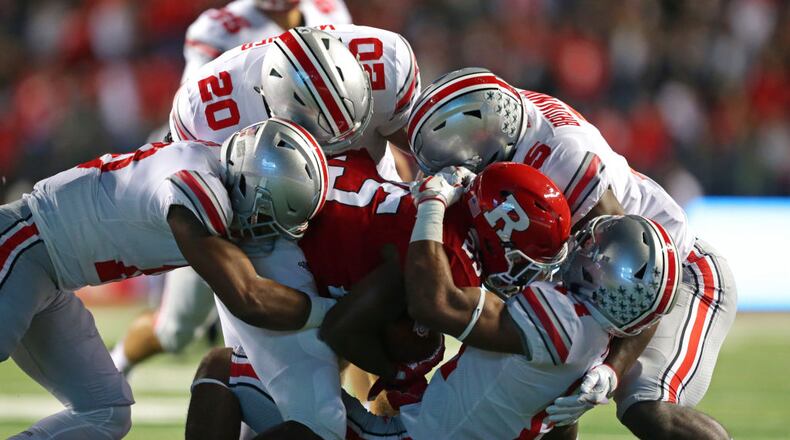Ohio State football: 5 things to know about Rutgers past and present https://t.co/FJcvRdChFk
— Marcus Hartman (@marcushartman) November 11, 2019
- "But Marcus," you might say, "everyone seems to be calling that the first football game. What gives?" And my answer would be they are wrong for the simple fact the game those teams played was not football, at least not the American kind, because the players weren't allowed to run with the ball.
- Wait, what? How do you know that?
- Now, admittedly I was not there, but the Rutgers athletics department provides all the information we need in its weekly game notes, which in detailing the game explains, "The ball could be advanced only by kicking or batting it with the feet, hands, heads or sides." That sounds an awful lot like a soccer game to me, and it turns out there is good reason or this…
.@RFootball vs. No. 1 Ohio State announced as a 3:30 p.m. start next Saturday at @SHI_Intl Stadium. @BigTenNetwork to televise.
— Rutgers Scarlet Knights (@RUAthletics) November 9, 2019
Tickets: https://t.co/rOnfjcA7GE#TheBirthplace pic.twitter.com/dlnPvco5S4
- The game notes further state, "rules for the contest (were) adopted from those of the London Football Association," and the official NCAA football record book (which, yes, recognizes the game as being part of college football history, so we're not just picking on Rutgers here because they aren't alone in misidentifying this game) notes an "Association ball" was used in 1869. That would mean what they played wasn't just kind of soccer but specifically soccer because that is what the Football Association created the rules for in 1863. (This became necessary because there was a disagreement among teams in England about whether or not carrying the ball should be allowed. Those who wanted to be able to went their own way, and their rules became the basis for rugby.)
Next time you're on College Ave at @RutgersNB, make sure to check out the brand new plaque commemorating #TheBirthplace of College Football. #RutgersPride #CFB150 pic.twitter.com/5dC4WIIUwR
— Rutgers University (@RutgersU) November 6, 2019
- So, to recap: Rutgers and Princeton played a game in 1869 with a round, rubber ball, goals were worth one point, carrying the ball was prohibited, and they did it that way not coincidentally because they were following the rules of the organization that created soccer.
- Further proof: Walter Camp, who is generally regarded as the father of American football, wrote in his 1891 book appropriately titled, American Football ,the first American college game played under rugby rules was in 1876, and it wasn't in New Jersey but in New Haven, Conn. This is consistent with the NCAA rulebook, which identifies 1876 as the year "holding and carrying the ball" became legal. Rugby is not American football, either, but it is at least closer.
- Camp also writes "our American intercollegiate game was derived" from Rugby Union rules, which were not established until 1871.
- As far as when the game Eastern schools such as Rutgers, Princeton, Yale, Harvard, etc., were playing became American football, I would go with 1882. That is when downs and the concept of yards to gain entered the rules. Combined with the establishment of a line of scrimmage two years earlier (which camp called "the backbone to which the entire body of American football is attached"), now you've got something that is distinct from both rugby and soccer. Of course, that game is still a far cry from what we watch today, but you've got to crawl before you can run, and you've got to carry the ball before your sport can be awesome so that is good enough for me.
- So, yes, Rutgers and the NCAA and many other people have agreed to call a game played in New Jersey in 1869 against Princeton the first college football game, but they probably shouldn't because it is misleading in an overall sense.
- I guess you can call what Princeton and Rutgers did a kind of football, and since it was played by colleges in the United States it is in some sense the first college football game in America, but let's be real: There is a preponderance of evidence it wasn't American football, and that's what people are thinking of when they hear the term "college football" today (as college soccer exists in a wholly different form), so calling that game the first college football game is at best disingenuous.
- That was a lot of time spent on the past, but I'm comfortable with it because the College Football Playoff rankings that will be updated this week and next week and the week after still don't mean a lot in the grand scheme of things. I do find it interesting that in the first round they seemed to be more worried about the eye test than anything else, but that will only matter if they remain consistent as more games are played. (A big if.)
- If you're thinking now would be the time for me to weigh in on Ryan Finley's first start for the Bengals, you'd be correct — except my power went out Sunday afternoon and I was only able to watch part of the debacle against the Ravens.
- Nonetheless, I am genuinely interested to see how Finley does the rest of the season. His showing promise would be a huge development for the Bengals as it would allow them to, with a clearer conscience at least, draft the best player available — Chase Young. I tend to think they should take him even if they are not sold on Finley because the defense badly needs playmakers and as good as Joe Burrow looked against Alabama, I still don't see him as a sure-thing like Young is.
- Few quarterbacks are sure-things, of course, but if the Bengals brass does its homework on Burrow and decides he is really their guy, I would also fully endorse taking him because that's a gamble worth taking. However, building the roster until the right quarterback comes along might be the smarter overall play because nowadays one of the best winning formulas is to win while you have a quarterback on a rookie deal before he commands the type of salary that would otherwise pay for two or three other starters.
- With the Bengals off last week, I watched all of Dwayne Haskins' first NFL start. The Redskins definitely did everything they could to prevent him from losing the game for them, but that also meant he had virtually no chance to win it, either. This game plan was straight out of the 1980s. Run, run, throw in obvious passing situations only. Haskins acquitted himself fairly well all things considered, but it will be interesting to see how he does without the training wheels.
“Marcus Musings” is a semi-regular feature here at the blog. While most of our other coverage is concentrated on news and analysis, this is a place to share opinions on various stories permeating the sports world and (hopefully) have some fun. Have your own thoughts? Send them along to marcus.hartman@coxin.com or find us on Twitter or Facebook.
About the Author

